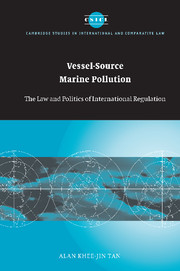Book contents
- Frontmatter
- Contents
- Foreword
- Preface
- Table of Conventions
- Table of European Union Instruments
- Table of IMO Resolutions and Guidelines
- Table of Miscellaneous Instruments
- Table of Domestic Legislation
- Table of Cases (International Courts and Tribunals)
- Abbreviations
- Part A The Regulation of Vessel-Source Pollution in its Eco-Political Context
- Part B Vessel-Source Pollution and the International Legislative Process
- 3 Vessel-Source Pollution and Regime Formation
- 4 Jurisdiction over Vessel-Source Marine Pollution
- 5 Implementation and Compliance
- 6 Liability and Compensation
- Part C The Future of Regulation
- Bibliography
- Index
- CAMBRIDGE STUDIES IN INTERNATIONAL AND COMPARATIVE LAW
5 - Implementation and Compliance
Published online by Cambridge University Press: 24 July 2009
- Frontmatter
- Contents
- Foreword
- Preface
- Table of Conventions
- Table of European Union Instruments
- Table of IMO Resolutions and Guidelines
- Table of Miscellaneous Instruments
- Table of Domestic Legislation
- Table of Cases (International Courts and Tribunals)
- Abbreviations
- Part A The Regulation of Vessel-Source Pollution in its Eco-Political Context
- Part B Vessel-Source Pollution and the International Legislative Process
- 3 Vessel-Source Pollution and Regime Formation
- 4 Jurisdiction over Vessel-Source Marine Pollution
- 5 Implementation and Compliance
- 6 Liability and Compensation
- Part C The Future of Regulation
- Bibliography
- Index
- CAMBRIDGE STUDIES IN INTERNATIONAL AND COMPARATIVE LAW
Summary
Overview
The previous chapters have examined how the international regime formation process achieves agreement on the substantive vessel-source pollution standards and the jurisdictional competence of states to prescribe and enforce these standards. As examined earlier, multilateral standard-setting is conducted primarily within the IMO arena where the interests of the relevant actors are advanced and reconciled. Once resultant compromises or outcomes are reached in the form of conventional rules, these are transmitted to the states for ratification and implementation. Thus, where the rule-making competence of IMO ends, the domestic implementation of internationally formulated rules begins.
Needless to say, a uniform global regime can be effective only when the relevant rules are implemented and enforced adequately and command a high degree of compliance by those ‘target actors’ at whom they are directed. In this regard, ‘implementation’ refers to the measures which states adopt at the national level to make relevant treaty rules effective in domestic law. From a broader perspective, ‘implementation’ is concerned with the state's overall effort to accomplish the objectives of a body of rules. On its part, the related but narrower concept of ‘enforcement’ entails the direct and immediate bringing into force of rules by states (often, on pain of penalties or sanctions) to compel ‘compliance’ on the part of target actors.
Compliance thus goes beyond implementation and refers to whether states are putting into effect the measures which they have instituted and whether target actors are in fact adhering or conforming to the rules.
- Type
- Chapter
- Information
- Vessel-Source Marine PollutionThe Law and Politics of International Regulation, pp. 230 - 285Publisher: Cambridge University PressPrint publication year: 2005



